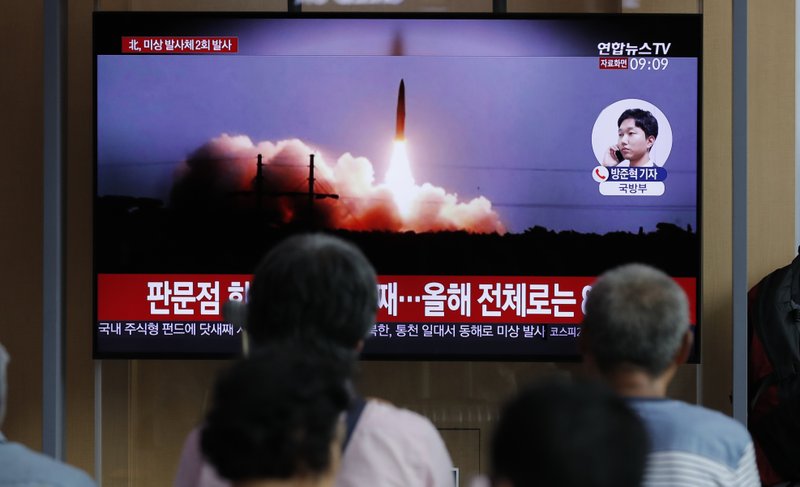SEOUL, South Korea -- North Korea launched a projectile toward the Sea of Japan early today, just hours after announcing that it had agreed to resume long-stalled talks with the United States over its nuclear weapons program.
The projectile was shot off from near Wonsan, a city east of Pyongyang, the North Korean capital, the South Korean military said in a statement.
According to Seoul's Joint Chiefs of Staff, the missile flew about 280 miles before landing between the Korean Peninsula and Japan. The Joint Chiefs of Staff said South Korean and U.S. authorities were analyzing more details of the launch.
The launching was the ninth time North Korea has tested ballistic missiles or other projectiles since late July, and was its first weapons test since Sept. 10, when it fired what it called two super-large caliber rockets.
Japanese Chief Cabinet Secretary Yoshihide Suga earlier said the North fired two ballistic missiles from the country's east coast, and one of them appeared to have landed inside Japan's exclusive economic zone off the northwestern coast. There were no reports of damage to Japanese vessels or aircraft traveling in the area, he said.
Only a day earlier, officials in North Korea and the United States said they had agreed to resume long-stalled official talks this weekend over the nuclear program -- the first substantive discussions since a summit meeting failed in February.
North Korean Vice Foreign Minister Choe Son Hui said the two countries "agreed to hold a working-level discussion on October 5th, after a preliminary contact on the 4th," according to a statement carried by North Korea's state-run Korean Central News Agency.
"I expect the working-level talks to accelerate positive developments in DPRK-U.S. relations," Choe said, using the initials of her country's official name, the Democratic People's Republic of Korea. "Our representatives are ready to attend the working-level talks with the United States."
State Department spokeswoman Morgan Ortagus told reporters that officials from the two countries plan to meet "within the next week."
Choe's announcement came after North Korea praised Trump last month for suggesting that Washington may pursue an unspecified "new method" in nuclear negotiations with the North. North Korea also has welcomed Trump's decision to fire hawkish former national security adviser John Bolton, who advocated a "Libya model" of unilateral denuclearization as a template for North Korea.
The 2004 disarmament of Libya is seen by North Korea as a deeply provocative comparison because Libyan leader Moammar Gadhafi was killed after U.S.-supported military action in his country seven years after giving up a rudimentary nuclear program that was far less advanced than North Korea's.
The office of South Korean President Moon Jae-in, who lobbied to set up the first summit between Kim and Trump last year in Singapore, welcomed Choe's announcement and expressed hope that the resumed talks would result in "substantial progress" in denuclearization and stabilization of peace.
Negotiations between the U.S. and North Korea have been frozen since the breakdown of a summit between Trump and Kim in Hanoi in February.
Those talks broke down after the U.S. rejected North Korean demands for broad sanctions relief in exchange for partially surrendering its nuclear capabilities.
Another meeting between the two leaders at the Demilitarized Zone between the two Koreas in June was supposed to lead to a resumption of negotiations, but the stalemate persisted, with North Korea complaining about joint military exercises carried out by the United States and South Korea.
On Monday, North Korea blamed the stalling of the dialogue on Washington and Seoul, accusing them of failing to keep their promises.
North Korean Ambassador Kim Song told the U.N. General Assembly that it was up to the United States whether negotiations "will become a window of opportunity or an occasion that will hasten the crisis."
"The situation on the Korean Peninsula has not come out of the vicious cycle of increased tension, which is entirely attributable to the political and military provocations perpetrated by the U.S.," the ambassador said.
North Korea also has insisted that talks will succeed only if the United States takes a different approach from the one it took in Hanoi, but it has been careful not to criticize Trump directly.
Experts said Pyongyang saw a potential window of opportunity for progress under Trump.
"As this year draws to an end, Kim Jong Un is trying to speed up the nuclear talks," said Yang Moo-jin, a professor at the University of North Korean Studies in Seoul.
"Next year, the United States will have its presidential election, and South Korea will have a legislative election. Kim's strategy could be to have his third meeting with President Trump before next year to get the best result ahead of the elections race."
Leif-Eric Easley, a professor at Ewha University in Seoul, said the removal of Bolton as White House national security adviser might have encouraged North Korea to think it could win sanctions relief by making a deal with Trump. Bolton had consistently held a hard line on North Korea. In return, Easley said, Pyongyang might offer concessions, such as an unverifiable freeze on nuclear weapons production, that Trump could present as a symbolic victory.
"With Bolton out of the administration and the U.S. Congress talking impeachment, Pyongyang sees an opportunity," Easley said.
On Monday, Bolton called North Korea's nuclear weapons a "grave and growing threat."
"Under current circumstances, he will never give up nuclear weapons voluntarily," Bolton said, referring to Kim Jong Un.
Information for this article was contributed by Simon Denyer and Min Joo Kim of The Washington Post; by Kim Tong-Hyung, Matt Lee, Hyung-jin Kim and Mari Yamaguchi of The Associated Press; and by Choe Sang-Hun and David E. Sanger of The New York Times.
A Section on 10/02/2019
